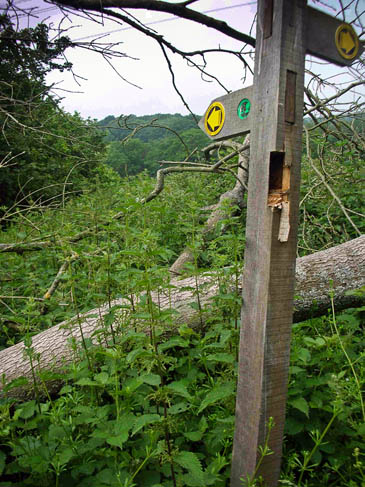Deep cuts to council rights-of-way budgets are likely to leave paths overgrown and unusable, Britain’s largest walkers’ charity warned.
The Ramblers said the effect of cuts will not only damage people’s ability to get outdoors but will increasingly hit tourism, the economy and the nation’s physical and mental health.
A freedom of information request revealed almost 70 per cent of councils have cut their rights-of-way budgets over the past three years.
The Ramblers said 41 per cent of councils have cut their budgets by more than 20 per cent with 11 per cent reducing funding by more than half. The campaigning organisation has compiled a list of ‘councils of concern’ which have made the most savage cuts to rights of way budgets and the staff who look after them.
These include Cumbria County Council, which has cut staff by five in a £394,000 reduction to its budget.
Bury and Medway Councils have both cut funding by more than 70 per cent and Warwickshire has lost more than half its rights-of-way staff.
Others on the list include Redcar and Cleveland, Shropshire, Lincolnshire, Norfolk, Bolton, Gloucestershire and Hertfordshire, which has slashed almost £1m from its budget.
A Ramblers spokesperson said: “Such drastic cuts to funding and staffing is having a real impact on the ground, with paths becoming overgrown and stiles, gates and bridges falling into disrepair.
“In Lancashire the number of paths which have become overgrown, blocked, or fallen into disrepair has more than doubled in the last two years as severe council cuts have started to bite.
“Norfolk County Council has made cuts of nearly 70 per cent to their rights of way budget, ceasing all regular cutting duties which is rapidly leaving paths unwalkable.
“As paths in England become more impenetrable, people will stop walking them and the problem will become worse, leaving councils with a far greater maintenance bill than the cost if these problems were tackled now.
“The Ramblers has groups of volunteers across the country who work with councils to help keep footpaths clear and accessible, but with less funds in place for path clearance and fewer staff to co-ordinate volunteers and liaise with landowners, it is becoming harder for volunteering to take place.
“By cutting down on staff resource, many councils are drastically reducing the amount of path maintenance work which can be done, both by paid staff and by volunteers.”
The charity said more than 9 million adults in England walk for recreation at least once a month, making walking one of the nation’s favourite pastimes.
Nicky Philpott, director of campaigns and policy at the Ramblers, said: “These cuts are worryingly short-sighted.
“Our path network is the gateway to the countryside, and connects people from their doorsteps to parks and green spaces in towns and cities. They enable people to get outside, reconnect with nature, spend quality time with loved ones, clear their head, spot wildlife, revisit history and explore the beautiful cities and countryside which England has to offer.
“In the current economic climate, we didn’t expect funding for rights of way to be untouched.
“But these statistics show the disproportionate effect of council cuts on rights of way and the teams which look after them, to the extent that in many cases the resources aren’t even there to coordinate and utilise our volunteers who are ready and willing to help councils keep paths clear.
“Keeping paths clear is a small cost compared to the huge benefits they can bring to tourism, the economy and the nation’s health and happiness and it is vital that councils properly invest in them.”
The full report can be seen on the Ramblers’ website.

